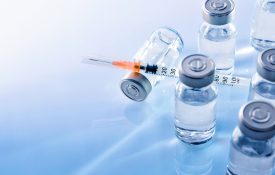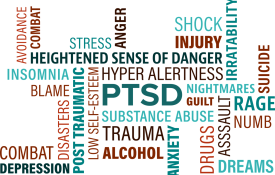
Therapists high in competence and warmth may also boost patients’ willingness to continue treatment and even improve clinical outcomes.

To speak about self-injury and how online communities might help, Emma Preston, an APS member and graduate student at the University of Southern California, joined APS’s Ludmila Nunes.

More often than not, recipients of support perceive offers of help far more positively than we might expect them to.

Depression may be more closely related to how we perceive our relationships and position within a community than to whether or not we are socializing with others.

This PSPI Live is focused on how psychological interventions can be part of a comprehensive plan to manage chronic pain.

We often hear of the adverse chronic effects and burden of psychopathology. But many patients go on to attain a purposeful and autonomous life.

People who have suffered from mental illness can go on to develop a long-lasting sense of well-being and achieve a “high-functioning” life.

Unaddressed mental health concerns can echo through the generations of a family, but the exact path depression, anxiety, and other disorders may take through the branches of a family tree isn’t always straightforward.

Advances in assessment and intervention could help tip the scale toward survival, one life at a time.

Bilingual people from cultural backgrounds in which mental health is a taboo topic may be more open to treatment when they hear information in their second language.

Can psychological science provide safer approaches to managing chronic pain and overcoming addiction?

Narrative interventions using storytelling may provide impactful solutions for shifting behavioral intentions, beliefs, and attitudes around extremist violence.

As of December 2021, a record 82.4 million people have been forced to flee their homes to escape war, violence, or persecution. Here’s a look at some recent research (2017–2021) on refugee integration and well-being.

Trauma-sensitive and socioculturally adapted group intervention can significantly reduce posttraumatic stress disorder.

The latest Psychological Science in the Public Interest examines psychological interventions for the treatment of chronic pain.

People who can imagine achieving their goals in greater detail are less likely to be or to become depressed.

Pipeline programs (also known as pathway programs) are designed to provide support and resources to aspiring, early-career, and established scholars from diverse ethnic, gender, and economic backgrounds.

Podcast addresses the long-standing structural features of the military that have created a culture and society that is dramatically different and disconnected from civilian society.

The benefits of interventions—actions or policies intended to elicit a change in a person’s life—may either be lasting or fade over time.

The IAT may help identify and provide additional support to individuals at risk of attempting suicide.

It may sound like he’s inducing amnesia, but psychology professor Tom Beckers is actually testing the possibility of targeting and muffling psychologically crippling memories.

Showing love for your nearest and dearest is a hallmark of Valentine’s Day, but research suggests that you may want to save some of that love and compassion for yourself.

Interventions to reduce unwanted behaviors often focus on retraining people’s mental associations, but showing people the consequences of the behaviors may be more effective.

A report in Psychological Science in the Public Interest identifies the most effective ways to increase vaccination rates.

Intending to follow through with health recommendations may depend on how many suggestions your doctor gives.

APS James McKeen Cattell Fellow Robert J. DeRubeis is applying actuarial modeling to mental health care to improve treatment selection and ensure that patients receive care that meets their individual needs.

The spread of mindfulness and meditation as wellness tools outpaces scientific evidence, a team of researchers concludes.

A study examining the cost-effectiveness of nudges and typical policy interventions shows that nudges often yield high returns at a low cost.

Transcranial direct-current stimulation may be growing in popularity, but research suggests that it probably does not add meaningful benefit to cognitive training.

A new meta-analysis suggest that team-building interventions that utilize an interactive component can significantly improve team performance.

In a significant departure from current practices, NIH has issued new policies relating to grant applications involving clinical trials, including one mandating that all applications involving clinical trials must be in response to a funding opportunity designed for clinical trials.

Psychological scientists are studying promising interventions designed to change the mind-sets of students who believe their intelligence is limited or fixed.

Driving a car is one of the most cognitively complex tasks we engage in on a daily basis. Driving requires an assortment of cognitive skills including executive functioning, information processing, visual processing, and memory. As

A group of prominent psychological scientists outlines specific solutions to help individuals and policymakers maintain healthy habits.

September 10 is World Suicide Prevention Day. Read about the steps that psychological scientists are taking to identify and help people at risk of taking their own lives.

Treating workers’ sleep problems may be one way to improve employee satisfaction on the job, according to new research. After analyzing data from nearly 5,000 employed adults, a team of psychological scientists from Stockholm University

Some studies have begun to hint that personal psychological resources — such as self-esteem — may mediate the relationship between job demands and job resources and burnout.

Experts from the APS Global Collaboration on COVID-19 have responded to a call for input on digital health from the White House.

Data from an online smoking cessation intervention demonstrate the potential of bringing evidence-based mental health care to a wider range of people via the internet.

Loneliness may be a fundamental part of the human condition, but scientists have only recently begun exploring its causes, consequences, and potential interventions. A special section in Perspectives on Psychological Science, a journal of the

Many people suffering from depression are not seeking treatment, but researchers have identified a possible communication technique that could spur help-seeking.

Depression treatments include both psychotherapy and pharmacotherapy, but a burgeoning area of research points to another potent therapy: nutrition

A series of articles examines how to help enhance current treatments for mental illnesses and spur the development of new intervention and prevention approaches.

A one-time intervention that educates teens about the changeable nature of personality traits may prevent an increase in depressive symptoms often seen during the transition to high school.

Despite the availability of effective evidence-based treatment, about 40% of individuals with serious mental illness do not receive care and many who begin an intervention fail to complete it.

People who tend to ruminate — engaging in a cycle of negative, repetitive thoughts — are at risk for depression and other psychological disorders. Is there a way to stop the broken record? Research published

Drug-dependent people who least take the future into account may, paradoxically, be the ones to benefit the most from certain treatments, a clinical study suggests.

Psychological scientist Mary Czerwinski explores how embedding sensors into clothing can measure -- and possibly help regulate -- emotions.

Considerable research explores the relationship between negative emotion and disordered eating behaviors, such as binge eating and purging. But a new study suggests that positive emotions may also play a role in rewarding and maintaining

Older adults are encouraged to stay active to keep their minds sharp. But new findings from a longitudinal study suggests that only demanding activities — such as learning photography — will benefit cognitive functioning.

Clinical research has identified certain psychological interventions that effectively ameliorate the symptoms of PTSD, although most people struggling with the disorder don’t receive those treatments, according to a scientific review.

Scientists find that simply encouraging people to reframe the signs of stress before public speaking was a surprisingly effective way of handling stage fright.

Scientists have mostly focused on the benefits of meditation for the brain and the body, but research suggests that meditation may also have impacts on interpersonal harmony and compassion.

Encouraging young people at high-risk of delinquency to see happiness rather than anger in facial expressions appears to dampen their levels of anger and aggression

Research highlights a memory strategy that may help people who suffer from depression in recalling positive day-to-day experiences.

Marital satisfaction generally declines over time, but a brief writing intervention that helps spouses adopt a more objective outlook on marital conflict could help prevent couples from losing that loving feeling.

A scientific review shows that a psychological intervention commonly employed to help victims who have just experienced a disaster lacks evidence supporting its effectiveness and may actually be harmful.

New research associates early life adversity with the presentation of social anxiety disorder later in life.

In a new issue of Psychological Science in the Public Interest, researchers propose novel treatment strategies, based on advances in brain science, that could help prevent abuse of opioids and other drugs.

Clinical researchers are developing a new therapy that may reduce or eliminate symptoms of a challenging psychological disorder within weeks, rather than months.
